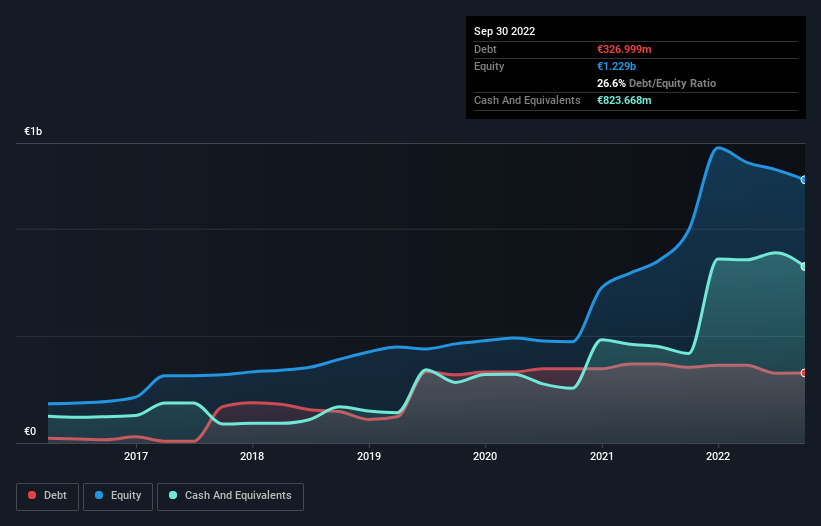David Iben put it well when he said, 'Volatility is not a risk we care about. What we care about is avoiding the permanent loss of capital.' So it might be obvious that you need to consider debt, when you think about how risky any given stock is, because too much debt can sink a company. We can see that Evotec SE (ETR:EVT) does use debt in its business. But is this debt a concern to shareholders?
What Risk Does Debt Bring?
Debt assists a business until the business has trouble paying it off, either with new capital or with free cash flow. If things get really bad, the lenders can take control of the business. However, a more frequent (but still costly) occurrence is where a company must issue shares at bargain-basement prices, permanently diluting shareholders, just to shore up its balance sheet. Of course, plenty of companies use debt to fund growth, without any negative consequences. When we think about a company's use of debt, we first look at cash and debt together.
See our latest analysis for Evotec
How Much Debt Does Evotec Carry?
You can click the graphic below for the historical numbers, but it shows that Evotec had €327.0m of debt in September 2022, down from €352.9m, one year before. However, it does have €823.7m in cash offsetting this, leading to net cash of €496.7m.

How Strong Is Evotec's Balance Sheet?
The latest balance sheet data shows that Evotec had liabilities of €340.8m due within a year, and liabilities of €693.3m falling due after that. On the other hand, it had cash of €823.7m and €188.0m worth of receivables due within a year. So its liabilities total €22.5m more than the combination of its cash and short-term receivables.
Having regard to Evotec's size, it seems that its liquid assets are well balanced with its total liabilities. So it's very unlikely that the €3.13b company is short on cash, but still worth keeping an eye on the balance sheet. While it does have liabilities worth noting, Evotec also has more cash than debt, so we're pretty confident it can manage its debt safely. The balance sheet is clearly the area to focus on when you are analysing debt. But ultimately the future profitability of the business will decide if Evotec can strengthen its balance sheet over time. So if you want to see what the professionals think, you might find this free report on analyst profit forecasts to be interesting.
In the last year Evotec wasn't profitable at an EBIT level, but managed to grow its revenue by 22%, to €698m. Shareholders probably have their fingers crossed that it can grow its way to profits.
So How Risky Is Evotec?
While Evotec lost money on an earnings before interest and tax (EBIT) level, it actually generated positive free cash flow €121m. So taking that on face value, and considering the net cash situation, we don't think that the stock is too risky in the near term. One positive is that Evotec is growing revenue apace, which makes it easier to sell a growth story and raise capital if need be. But we still think it's somewhat risky. For riskier companies like Evotec I always like to keep an eye on the long term profit and revenue trends. Fortunately, you can click to see our interactive graph of its profit, revenue, and operating cashflow.
At the end of the day, it's often better to focus on companies that are free from net debt. You can access our special list of such companies (all with a track record of profit growth). It's free.
Valuation is complex, but we're here to simplify it.
Discover if Evotec might be undervalued or overvalued with our detailed analysis, featuring fair value estimates, potential risks, dividends, insider trades, and its financial condition.
Access Free AnalysisHave feedback on this article? Concerned about the content? Get in touch with us directly. Alternatively, email editorial-team (at) simplywallst.com.
This article by Simply Wall St is general in nature. We provide commentary based on historical data and analyst forecasts only using an unbiased methodology and our articles are not intended to be financial advice. It does not constitute a recommendation to buy or sell any stock, and does not take account of your objectives, or your financial situation. We aim to bring you long-term focused analysis driven by fundamental data. Note that our analysis may not factor in the latest price-sensitive company announcements or qualitative material. Simply Wall St has no position in any stocks mentioned.
About XTRA:EVT
Evotec
Operates as a drug discovery and development company in the United States, Germany, France, the United Kingdom, Switzerland, and internationally.
Excellent balance sheet and good value.
Similar Companies
Market Insights
Community Narratives




